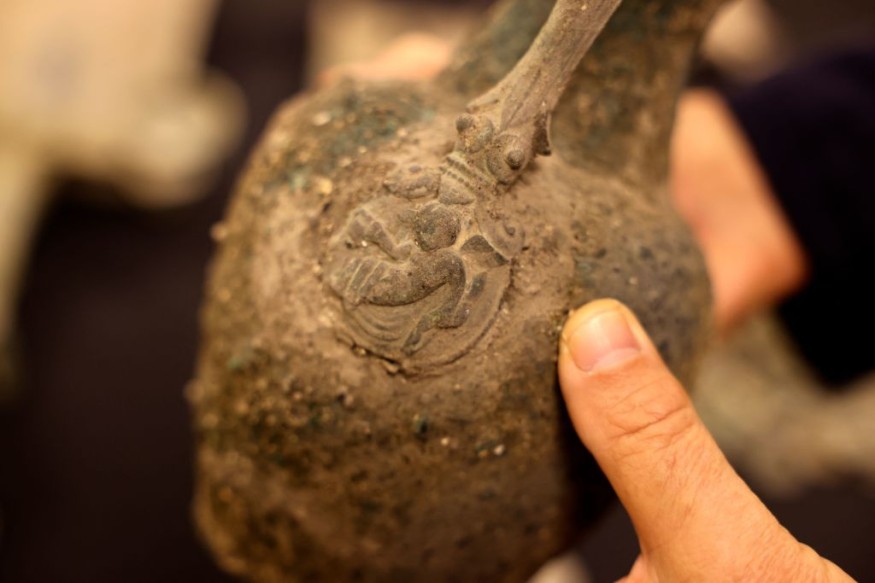
Researchers recovered ancient Roman jars from the ocean near the Italian harbor of San Felice Circeo, revealing the secrets of winemaking during the ancient Roman period.
Science Alert reported that researchers found three different wine jars, also called amphorae, that were recovered and analyzed, which gave researchers insights into the practices of winemaking in that particular region during the 1st to 2nd century BCE. They combined the latest chemical analysis technique with other approaches of archaeobotany to further analyze the Roman jars than would ever be possible.
Uzi Rotstein, inspector in the The Prevention Unit at Israel Antiquities Authority, displays a bronze jug, one of a number of artifacts seized from antiquities dealers, bearing a depiction of a Roman banquet, consistng of a scene showing a reclining figure holding a jug of wine, at his office in the central city of Bet Shemesh on December 16, 2021.
Chemical Analysis of the Underwater Jars
Researchers found the wine jars from a seabed deposit near the modern harbor of San Felice, Italy, about 56 miles (90 kilometers) southeast of Rome. The team used a combination of chemical analyses to uncover the ancient Roman winemaking process.
These techniques include analyzing chemical markers, plant tissue residue, and pollen from grape derivatives and pine within the jars. They found that the amphorae were used in making red and white wine, while pine was used to create the tar to waterproof the jars and add flavoring to the wine.
Science Daily also reported that the grapevine pollen matches the wild species found in the area. That means that winemakers from ancient Rome used locally sourced plants. However, it is unclear whether they were also the ones who cultivated those plants. On the other hand, the par tar is non-local and most likely imported from Calabria or Sicily and other sites.
In analyzing the jars, the team emphasized the importance of a multidisciplinary approach that characterized cultural practices from different archaeological artifacts.
They believe it is the message of finding ancient Roman winemaking's secrets. Using different approaches further pushed the knowledge and understanding of ancient Roman practices that would have been impossible with only a single method. In the study's case, it involved chemical analysis, historical and archaeological records, amphorae design, and archives.
History of Wine: When Did Winemaking Began?
Wine has always been a popular beverage to mankind even during ancient times. Its wonderful taste, nutritious properties, and intoxicating effects have lured humankind to wine.
According to an article in Arena Flowers, wine is historically the only alcoholic drink that has such a profound impact on society. Cultures trade wine secrets that opened up channels for religious and philosophical ideas across Europe. Also, it was mentioned in the bible from Noah's story that many believed him to be the first winemaker.
But no one can be sure when it was created. There was one story of an ancient Persian fable that credited the discovery of wine to a woman who said she was a princess who had lost favor with the King. She was overwhelmingly shamed and ate some table grapes that were spoiled in a jar in an attempt to end her life.
But it did not kill her and she found all troubles in her life seemingly have passed. She continued eating spoilt grapes and her mood changed so much that she regained the King's favor. It might just be a tale, but a wine's accidental discovery is surely down to pure luck.
Today, wine is still used in the Catholic Church as a substitute for the blood of Christ, indicating the beverage's role for many centuries. A wine industry was also seen before as a mark of a provident country as only developed societies can afford to have a wine industry. Many believed that western countries have their foundations in wine.
RELATED ARTICLE: Historic Warship That Sank 340 Years Ago Contained Unopened Wine Bottles, Crest of Washington's Ancestors
Check out more news and information on Archaeology in Science Times.
© 2026 ScienceTimes.com All rights reserved. Do not reproduce without permission. The window to the world of Science Times.












